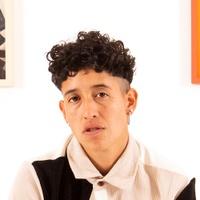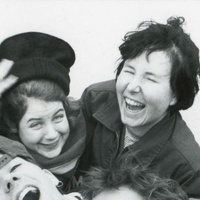On telling stories for the voiceless
Prelude
Hugo Hamilton is the best-selling author of The Speckled People, a memoir of his German-Irish childhood in Dublin, where he grew up with a German mother and was prohibited by his revolutionary Irish father from speaking English. His latest novel is The Pages (Knopf) and his short story “Autobahn” was recently published in the New Yorker. Hamilton is a member of the Aosdána and lives in Dublin.
Conversation
On telling stories for the voiceless
Writer Hugo Hamilton discusses the subtle difference between memoir and fiction, the necessity of self-mythologizing, and the kindness of strangers on his book tour.
As told to Mána Taylor, 1849 words.
Tags: Writing, Family, Beginnings, Success, Inspiration.
When did you know you wanted to be a writer and how did writing come about as creative practice?
Writing was a very formative event in my life because of my background as a German-Irish child growing up in Dublin, being prohibited by my father from speaking in English. I became a very silent child and a very silent grown-up person. The only way I could find to give expression to what I felt and what I experienced in my life was through writing. I couldn’t be understood in any other way. First of all, I had to always be careful what language I would speak. I wasn’t allowed to speak English in the house. German on the street was also kind of taboo because I would be targeted as a Nazi. People would call us Nazis. And then the Irish language was also not very popular in Ireland, because although lots of people were being encouraged to speak it, the Irish language was always connected with poverty and a history of trauma in Ireland. Luckily, that has changed now, and there are lots of Irish speakers who are very proud to speak the language.
You wrote your memoir,The Speckled People, from the perspective of yourself at a very young age. I’m interested in the process of writing from memory, but also from the perspective of being silenced.
In order to tell that story of my childhood, I had to effectively relive that time. That was enabled by the fact that my mother kept diaries. She kept a journal all the way through our childhood. All the events that are recorded in The Speckled People are there in my mother’s journal, along with the extraordinary loneliness and homesickness that she felt living in Ireland under what became a very strict, crusading regime that my father introduced. She did the groundwork, in some ways, for my memoir. In another world, I think she would’ve been a writer too. She had a way of mythologizing family life and stories. I suppose that’s often what mothers do. The funny or tragic stories that happen in a family become mythologized and told again and again. And my mother was brilliant at that.
Often that’s the most interesting aspect of storytelling—when someone doesn’t even realize they’re doing something creative, they’re just documenting. I think that comes out in your work.
Yeah, I mean, you asked me about when I became a writer or how I became a writer. I could give you an example from my childhood, when my mother asked me to put a bowl of mashed potato on the table for dinner. Instead of doing that, I brought it into another room and got my brothers and sisters to throw the mashed potato at the ceiling. It was a bizarre, crazy, childish thing to do, but it was the reaction of my mother that was so interesting. My father came in and he was furious, but my mother said, “No, no, this is something creative. It takes a lot of imagination to do something as wild as that.” So in some ways, that is where my writing career began: when I was encouraged by my mother to do something completely nuts. I suppose that still stands with me now.
It’s really great that she nurtured that instead of fighting against it.
There was enough punishment going on in our house, but this was a wonderful moment where she celebrated creativity. And not just creativity in the formal sense of painting and writing stories, but [creativity] completely outside the box. I’d say Marina Abramović would’ve loved that.
Yes, definitely!
It’s the kind of thing she would’ve thought of, I think. She possibly did something like that. That’s who I think of as somebody who completely breaks down the kind of intellectual guidelines, guardrails that we have in our lives.
That reminds me that your most recent book, The Pages has a very unique narrator: a banned book. That’s a very outside-the-box thing to do.
When you’ve read The Speckled People, all those kinds of crazy events in our family story, it’s not a million miles away from what I’ve done with The Pages, to take on the voice of a book speaking. It’s almost the voice of a child written again in a different form.
How do you decide what book is a novel and what is a memoir?
It’s a good question. I’m not entirely sure that there’s a huge difference. Of course, in a memoir, you are almost commanding people, commanding the reader to believe everything. You’re kind of declaring this as the truth. Whereas in fiction, you’re inviting the reader to believe this. It is a subtle difference, but ultimately memoir writing is not just a confession. It’s not like a book of evidence in court. It is a creative enterprise. Any kind of retelling or recreation of memory is a creative act. Lots of psychologists and neuroscientists are talking about memory as a purposeful tool. We remember with a purpose. It’s not just remembering abstract events. There’s a reason why we remember something. All memory has a strategy.
In an interview with Deborah Treisman in the New Yorker, I described the story I [published] in the New Yorker recently, called “Autobahn.” It’s a story about a reconciliation with my father, and I describe it as sort of a live engagement with memory. For me, that’s a very important thing, this idea of a live engagement with memory. It’s not just that you remember something and say, “My father gave me a mouth organ.” Me remembering him giving me a mouth organ changes my entire life. The memory of something that happened can be transformative. It can be life-changing. And that’s why I said it’s a live engagement with memory. And that story being published in the New Yorker has changed me. That has to be acknowledged. It changed me because it opened up a posthumous reconciliation with him.
In that story, you really found a way to use a small moment in time to tap into all these other histories and stories.
Well, that’s true. I kind of describe in the story how time collapses and it happens to all of us. A single moment in a person’s life is in fact an entire lifetime. It’s not just that moment. It’s everything that’s happened to that person before, and often even what’s going to happen in future. I mean, it’s a lifetime. We experience a lifetime in one moment.
I’m curious about your daily practice with writing. Do you have moments where memory comes to you and you feel like you need to write it down?
I keep a journal most of the time. One of the main characters in my book The Pages> is Joseph Roth, the German-Austrian author, and he said that writing, for him, was what allowed him to exist. Without writing, he would not exist. I think a lot of other writers have said this, and it’s not dissimilar to what happens to everybody. Unless we tell our story, then we don’t exist. If you don’t have somebody to talk to, if you don’t have somebody listening to your story, then you effectively disappear. You become voiceless. I had the experience as a child of becoming voiceless. So I’m very much aware of people and nations who become voiceless and who are not heard. The important thing about writing and storytelling is that it allows us to exist.
Do you feel like writing has helped you cope with those feelings of being voiceless in childhood?
Yeah. Growing up with three languages, and the kind of fear, the silence, the voicelessness that I experienced as a child living between those identities—it turned me into a writer as a way of establishing some kind of a home, of giving me some kind of a voice. I’ve said this frequently: I think, in my writing is where my home is. I live in Dublin. I often go to Berlin. I feel very much at home in Berlin, but there’s something else. I’m actually most at home in my writing. That’s where I exist.
There’s kind of a safety for all writers in writing because that’s where you can attempt to understand the world. Not that we want to control the world, but in some way the writer gives himself or herself a way of dealing with the world or fixing it down—fixing down all the things that are wrong or all the things that are beautiful. It reminds me all the time that we mythologize our lives and we mythologize each other, and that’s a very necessary human function, I think.
It seems, for many writers of memoirs, that writing is a way to reflect on and to really try to unpack and understand what happened.
I mean, it’s not like you can change the world and you can’t change your memory. You wake up in the morning and you still have the same mother and father that you had 20 or 30 years ago, or further back. And this probably applies to everybody; everybody has their own traumatic experiences, some much worse than others. But would you give them away, those bad experiences? I think it’s a mistake to try and get rid of them. It would be, in some ways, like cutting off your right arm. Cutting off your memory, even if it is a bad memory, is like cutting off part of yourself. And that’s what writing allows you to do, in many ways: to recognize your entire persona as a human being. It’s not just you and your own memory, but you in the community that you’re in as well. Nobody’s completely isolated, either.
Have you found a community through writing?
Yeah, yeah. Because I’ve been published, I know that I’ve been heard. I go on tour here in Germany very often. I read a passage from my memoir about my mother making cakes and how she rescued us with cakes and humor from our difficult time as children. And almost at every reading, somebody comes up to me and says they want to make a cake for me. It’s often happened that they have brought me cakes. It’s a funny thing, but they do connect with that story and that’s kind of lovely, the way my mother had of liberating us.
Hugo Hamilton recommends:
Lankum, Irish folk band
The Super 8 Years, Annie Ernaux film
The Rings of Saturn by W.G. Sebald (I read this book once a year)
Look at the rings of Saturn through a telescope with the naked eye, which I did recently at an observatory in Bamberg, Germany
Look at the rings of Saturn from an observatory in Los Angeles, which I hope to do very soon and is the best thing I can think of doing in these uncertain times
- Name
- Hugo Hamilton
- Vocation
- writer
Some Things
Pagination



